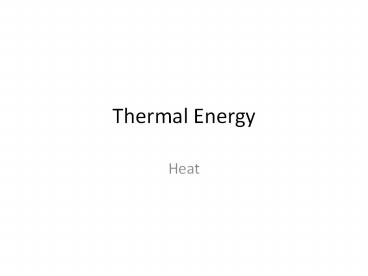Thermal Energy - PowerPoint PPT Presentation
Title:
Thermal Energy
Description:
Thermal Energy Heat Thermal Energy Thermal Energy The total energy of all the particles in an object Depends on temperature of the object # of particles in the ... – PowerPoint PPT presentation
Number of Views:83
Avg rating:3.0/5.0
Title: Thermal Energy
1
Thermal Energy
- Heat
2
Thermal Energy
3
Thermal Energy
- The total energy of all the particles in an
object - Depends on
- temperature of the object
- of particles in the object
- the arrangement of the particles in the object
4
(No Transcript)
5
(No Transcript)
6
Temperature
- Measure of average kinetic energy of the
particles - F- boiling 212
- - freezing 32
- C- boiling 100
- -freezing 0
- Kelvin- boiling 373
- - freezing 273
- Absolute zero -273 Celsius
7
Heat
- The transfer of thermal energy is heat.
- Moves from a warmer object to a cooler object
- Specific Heat the amount of energy required to
raise the temperature of 1 kilogram of a material
by 1 Kelvin. (in Joules)
8
Cup gets cooler while hand gets warmer
Heat The flow of thermal energy from one object
to another.
Heat always flows from warmer to cooler objects.
Ice gets warmer while hand gets cooler
9
Specific Heat
- Materials with high Specific Heat can absorb a
great deal of energy without a great change in
temperature. - Ex Water requires 4,180 joules to raise the
temperature 1 degree Kelvin.
10
Specific Heat Some things heat up or cool down
faster than others.
Land heats up and cools down faster than water
11
Why does water have such a high specific heat?
water metal
Water molecules form strong bonds with each
other therefore it takes more heat energy to
break them. Metals have weak bonds and do not
need as much energy to break them.
12
Heat Transfers
- Conduction- heat transferred through direct touch
- Convection- heat transferred through the movement
of currents in a fluid - Radiation- heat transferred through
electromagnetic waves
13
Heat Transfers
14
Conductors and Insulators
- Conductor- transfers thermal energy well
- Ex metals
- Insulators- transfers thermal energy very poorly
- Ex Wood, paper, plastic, gases in the air
15
Changes in State of Matter
- Depends on how much thermal energy
- Vaporization- matter changes from liquid to a gas
- Evaporation- vaporization at the surface
- Boiling- vaporization below the surface
- Melting- solid to liquid
- Freezing- liquid to solid
- Condensation- gas to liquid































